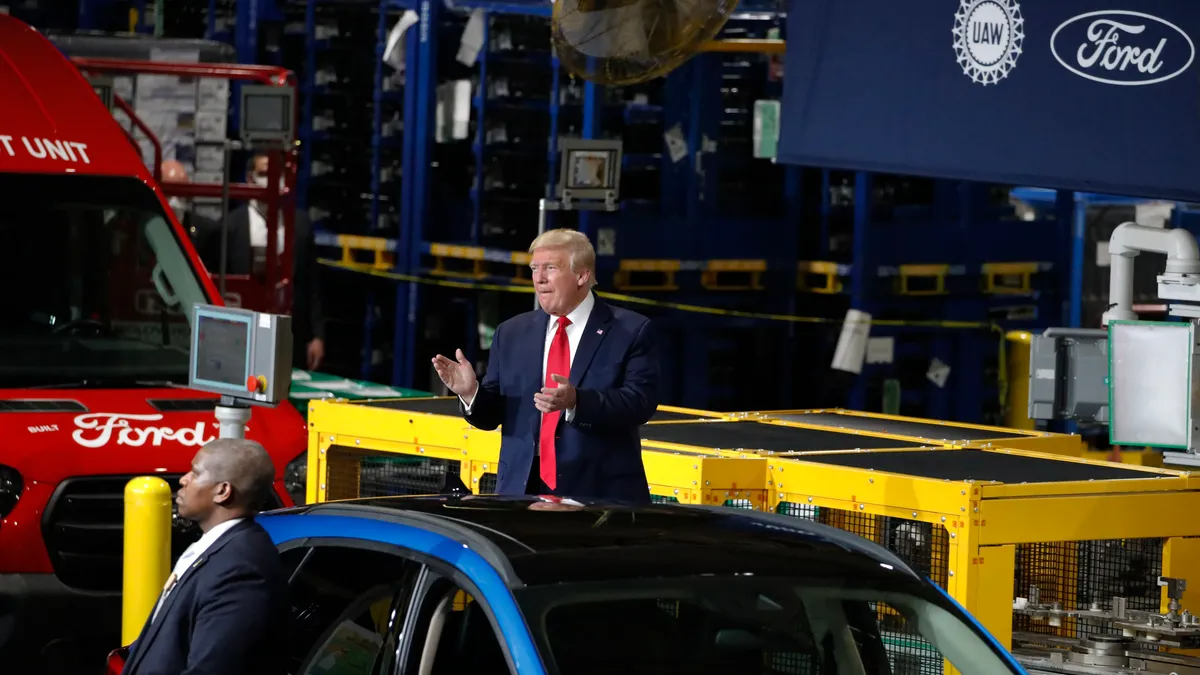
Trump's Tariff Relief: A Strategic Shift for the Automotive Industry
In a significant turn of policy direction, President Donald Trump is set to sign executive orders easing some of the burdensome 25% tariffs on autos and auto parts. This move comes after increasing concerns from both automakers and analysts that these tariffs could hamper the very factories they aim to protect, potentially hindering the competitiveness of U.S. production on a global scale.
Amidst mounting pressure, Trump has sought to portray this strategy as a temporary measure to assist automakers during a pivotal transition. "We just wanted to help them during this little transition, short term," Trump explained, clarifying that penalizing auto manufacturers was not the intention of imposing these tariffs in the first place.
Balancing Actions and Impacts: What This Means for Job Creation
Treasury Secretary Scott Bessent emphasized that the administration's ultimate goal is to catalyze job creation within the domestic manufacturing sector. By working collaboratively with both American and foreign auto producers, the administration hopes to provide a constructive pathway toward bolstering U.S. auto production.
The proposed executive measures offer a 15% rebate to automakers that ensure their vehicles are completed domestically. This rebate could diminish to 10% in the following year, allowing auto manufacturers to gradually realign their supply chains towards U.S.-based production. In essence, this strategy could allow for a ramp-up in the construction of new factories aimed at enhancing domestic manufacturing capabilities.
Reactions from Automotive Leaders
Industry executives have responded favorably to the proposed relief measures. Stellantis Chairman John Elkann expressed appreciation for the tariff adjustments, noting the company's commitment to collaborating with the administration. Similarly, General Motors CEO Mary Barra voiced gratitude for Trump's support, which she believes is vital for maintaining a competitive edge for American companies. Both leaders emphasized the potential for greater investment into U.S.-based operations if these conditions permit.
Future Predictions: The Evolving Landscape of Vehicle Manufacturing
The implications of these tariff changes extend beyond immediate relief; they may signal a profound shift in the structure of U.S. vehicle manufacturing. Analysts speculate that automakers may find this as an opportunity to invest significantly in Michigan electric vehicles, adaptive technologies, and other advanced automotive innovations.
With increased focus on sustainability, companies may shift their strategies toward hybrid and electric vehicles, adapting to evolving consumer preferences and regulatory landscapes. Furthermore, Michigan’s investment in electric vehicle (EV) charging stations could align with these anticipated changes, creating new job opportunities and enhancing the infrastructure necessary for this transition.
The Bigger Picture: Detroit's Role in National Mobility Trends
Detroit, once the heart of American automotive production, has an opportunity to reclaim its status by adapting to new mobility trends, particularly in urban transportation initiatives. Enhanced public transit systems and local policies supporting ride-sharing programs will be crucial as the automotive landscape shifts toward a more sustainable future.
Local stakeholders must prioritize downtown Detroit infrastructure projects while fostering collaboration between automotive manufacturers and urban planners. This synergy could lead to innovative solutions that enhance Detroit urban mobility, mitigating issues such as traffic congestion and inefficient transit systems. The potential for metro Detroit to lead a nationwide transition toward a more integrated and environmentally friendly transportation policy is ripe for exploration.
Conclusion: A Call to Action for Local Stakeholders
As these pivotal changes unfold, it is essential for stakeholders within metro Detroit — from dealerships and manufacturers to public transit agencies — to remain vigilant and proactive. Engaging in discussions about the future of automotive and transportation policies in Michigan will be vital in shaping an industry that not only meets consumer demands but champions sustainability.
This evolving landscape presents a unique opportunity to explore the nuances of Detroit traffic updates, commuter tips, and the benefits of Michigan's automotive technology innovation. Embrace these impending changes today — they could define the success of our local automotive market for years to come, fostering a more resilient, innovative, and sustainable community.
 Add Row
Add Row  Add
Add 



Write A Comment